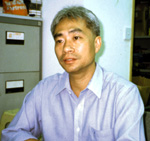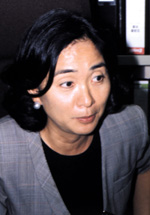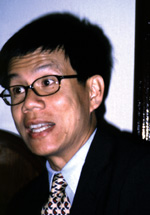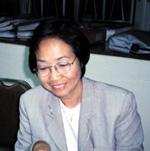 Online
Edition
Online
Edition | From
the editor Letters to the editor Milestone Answerman Periscope Campus Life Social Issues People Photo Features Education Channel Culture & Leisure Science |
| Last
Issue Archive |
| About
Varsity Advertise Media Links CUHK homepage JLM homepage |
Also
in Periscope
Party
laws needed
![]()
By Eric Leung
List voting favours small political groups
Mr. Leung Yiu Chung of The Neighbourhood and Workers Service Centre successfully won a seat in the 2000 election. He said the present system has its good sides.
“Small political groups can also enter the Legco under this system. A candidate who gets just 10 percent of votes in his or her geographical constituency can be returned as a Legco member,?said Mr. Leung.
However, he also said that the voters?preferences are probably not reflected under this system.
“Several candidates are on the same list. Electors may prefer the second and the third candidates to the first one. But it is usually the first one who wins a seat in Legco,?said Mr. Leung.
Concerning his success in the campaign, Mr. Leung said he was surprised by the results.
“I received 59,000 votes in the 2000 Legco election, which was 21,000 more votes than in 1998,?said Mr. Leung.
When trying to explain the sharp increase in support, Mr. Leung said he could not give a reason.
According to his experience in elections, Mr. Leung said that the political platform may not be the most important.
“The voters focus on what the candidates did in the past rather than on how well they present their political platforms,?he said.
When considering the role of legislators in society, Mr. Leung agreed that in recent years, the public has begun to lose confidence in the legislative branch.
“The HKSAR government has been in existence for 3 years. But Legco failed to play a dominant role in improving the living standards of the public,?said Mr. Leung.
Large constituency an obstacle to communication
Ms. Emily Lau, head of the Frontier Party, said the present election system hinders communication between candidates and voters.
“The geographical constituency is too large, but we have only two offices. We find it very difficult to communicate with about a million electors in the constituency,? said she.
Ms. Lau also said that the voters were not familiar with her running mate, Mr. Richard Tsoi.
“The result of the 2000 election was quite disappointing. Only Miss Ho Sau Lan and I were returned to Legco,?said she.
Apart from failing to establish close contacts with voters, Ms. Lau said that several other factors caused the setback.
“In the New Territories East geographical constituency, there were more candidates than before. Therefore the number of votes each candidate could get was reduced,?said Ms. Lau.
The Frontier also faced problems in responding to voters?needs.
Public opinion is also very diverse. Some voters prefer radical changes, while some do not.
“If the Frontier becomes too radical, we may lose the support from a certain sector of the public. But at the same time, our attitude cannot be too mild,? said Ms. Lau.
Ms. Lau said that another reason for the unsatisfactory election result was that she joined many committees.
Therefore she spent less time on local constituency affairs. That may have driven away some voters?support.
Ms. Lau said that she will focus on developing a closer contact with the public at this stage.
“The Frontier is not election-oriented. We want to strengthen the communication with the public in the first place,?said Ms. Lau.
Function of Legco in crisis
Mr. Andrew Cheng Ka Foo of the Democratic Party said that he will keep pushing
for a democratic election of the chief executive of Hong Kong.
“It is my goal to exert pressure on the government over the issue of chief executive election,?asserted Mr. Cheng.
Regarding defects in the present system for electing members of Legco, Mr. Cheng said the geographical constituencies are generally too large.
Said he: “Legco members find it difficult to address and fulfill all the needs of the public in the same constituency.
“Legco members feel very stressed because they do not know how they can help their people.?/font>
Apart from meeting voters?needs, Mr. Cheng also said that the system restricted the development of democracy in Hong Kong.
“The proportional representation system is not the root of problem. It is that, due to the Basic Law, only 24 seats in Legco are opened for free election. That is the real problem.?/font>
However, Mr. Cheng still appreciates the cleanliness of elections in Hong Kong.
“The elections in Hong Kong are clean, especially when compared with those of other Asian countries,?he said.
As for the development of party politics in Hong Kong, Mr. Cheng said that the power of Legco is being eroded.
“If Legco goes on being led by the executive branch, people will lose confidence in us. They may think whether they vote or not does not matter at all.
“The public will no longer think that Legco can help reflect their view.
“The increasing number of invalid votes is a sign of slashing public confidence in Legco,? said Mr. Cheng.
Codes of ethics a concern
Ms. Chan Yuen Han of the Democratic Alliance for Betterment of Hong Kong won a landslide victory in the 2000 election.
Ms. Chan said her victory proves that the voters are very mature.
“I did not set any goals before the election. I am so happy that I won 47 percent of the vote in my constituency,?said Ms. Chan.
“They were not judging us in terms of a single incident like the Gary Cheng scandal. They made long-term observations.
Said she: “Also they were critical about messages delivered by the mass media. They did not believe everything in the newspapers and on television.
“Hence the effect of the Gary Cheng scandal proved to be little.?
In her view, her success also showed that the public is less afraid of pro-Beijing parties.
“The ‘one country, two systems?principle has been well implemented. The mainland government respects our autonomy. The public is beginning to find that pro-Beijing parties are nothing to fear.?
Concerning prospects for development of her party, Ms Chan said it should pay more attention to codes of ethics.
“As a matter of fact, there is already a set of internal codes regulating DAB members? conduct ?say, the price of gifts we received should not exceed $300,? said Ms Chan.
“But further
discussion is necessary for strict implementation of such codes,?said
Ms. Chan. ![]()
|
Eric
Leung
 |
|
Eric
Leung
 |
|
Eric
Leung
 |
|
Germaine
Choi
 |